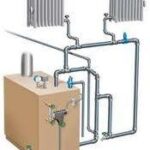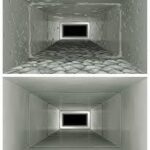Even in the summer, buyers should think about heating. Why? Because a buyer can’t feel how well the system works once it is shut off for the season. Even when we test it during home inspection, it is not the same as when it is fighting the winds howling outside.
This summer, there have been days when it is so hot, the heating won’t come on. Also, the new systems read the outside temperature; those won’t go on when it’s hot out, unless you override the controls. (Home inspectors are not going to change your boiler settings. It is too technical and they are not trained to adjust every type of boiler).
In New England, the heat is on about half the year. In fall and spring, it generally goes on at night and turns off during the day until the temperatures go to all winter-like or summer-like. How well your heating works will affect how happy you are in your new home for half of every year.
How do heating systems work?
Boilers send hot water or steam through pipes to radiators in each room.
Furnaces send hot air through ductwork to registers in each room.
Electric heating heats a coil that radiates heat into the room. Some electric heaters have fans.
Hydro-air has both a boiler and an air handler. A hot water coil heats air that goes through ducts to registers in the room.
Ductless split-systems are forced hot air and cool air systems that heat by individual unit and cool by a single compressor outside.
What you see in the rooms:
Radiators hold steam or hot water. Those big old honkin’ cast iron radiators might do either hot water or steam. Hot water also works in perimeter baseboards and fancy-pants towel-warming racks that you may see in bathrooms.
Hot water baseboards run along the perimeter of the room. You can differentiate them from electric baseboard by looking for a copper pipe going into the floor near the end.
 Vents distribute hot (and sometimes cool) air from furnaces throughout the house. Look for rectangular, or square, or circular openings in heated rooms.
Vents distribute hot (and sometimes cool) air from furnaces throughout the house. Look for rectangular, or square, or circular openings in heated rooms.
Radiant heat is hot water heating built into the floor below the tile or vinyl flooring. You will feel it and not see it. Look for a thermostat on the wall, since these systems adjust that way.
Ductless split-systems have rectangular units mounted high on the wall, usually an exterior wall.
Electric heat generally has a controller for each unit. Square units may have a knob on them. Baseboard have a knob on the unit or there’s a thermostat on the wall.
Pros and cons:
Forced hot water is the most preferred and most common heating system found in New England. It is considered the most comfortable way to heat. It is also fairly versatile and relatively easy to add onto.
Steam is also comfortable, but less so. Steam went out of fashion just after WWII. In most residential steam heating systems, the air vents on the radiators will hiss intermittently when the system is operating. That’s normal, but it annoys some people.
Hot air registers don’t take up space like radiators, the same ductwork can often be used for air conditioning systems, and the installation and operating cost of the equipment is low. However, the heat is appreciably less comfortable than forced hot water systems in our climate. Hydro-air systems are more comfortable because moist air hold heat longer and feels less drafty.
Ductless split systems are more efficient because you can control each room. The air conditioning runs off a single compressor, so it is quieter than window or wall ACs.
Electric heat is cheap to install, but expensive to run. It is suitable for places that you only use occasionally and don’t need to keep warm all winter (like garages and outbuildings.)
Gravity Steam or hot water systems were designed to run without an electric pump. The stream or water rises by convection. These systems are very expensive to run.
Extra costs:
Adding onto these old steam heating system can be (though it isn’t always) complicated. Since trapped steam bangs, it takes skill to add on correctly.
Forced hot air heat or central air conditioning, require professional duct cleaning. It gets dusty (and sometimes moldy) in there! Having it properly removed is expensive, but worth it — especially if anyone in your home has allergies or is prone to respiratory problems.
Steam or hot water radiators get pretty hot, so some folks install radiator covers to protect children. Radiator covers retard the convective process, so they reduce efficiency and raise operating costs. If you get covers, make sure that the top has a good air flow and there is air flow around the radiator.
High-tech systems run more efficiently, but like a luxury vehicle, they need more attention. Therefore, more tune-ups; therefore, more maintenance costs.

Leave A Comment